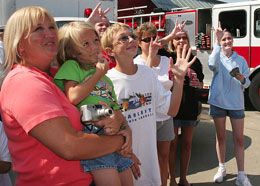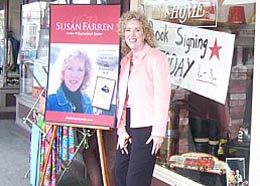 AP Photo/David Kohl Family members wave to Cincinnati firefighters in September 2005 as they depart for Miss. to help with Hurricane Katrina relief. |
Like most civilians who get the chance to see a training academy live burn close up, one thing stood out for Ellen Kirschman — the complete darkness of it all.
As part of a special media training day, the clinical psychologist took part in a range of drills to research her book on the challenges faced by firefighter families.
The live burn made the biggest impression — and drove home the fact that family members of firefighters are also often in the dark about many aspects of the job.
“I came home and asked my brother, who is a volunteer firefighter, why he never told me it was pitch black,” Kirschman said. “He just told me, ‘I thought everyone knew that.’ It made me realize firefighters just aren’t very good at talking about stuff that happens at work.”
Such examples, Kirschman said, highlight the need for improved communication in firefighter families — both from the firefighters and their partners.
She has worked with public safety personnel, their agencies and their families for nearly 30 years. Her 2005 book, “I Love a Fire Fighter,” looks at the issues involved and the toll that being in the fire service family can sometimes take on the family at home.
Communication breakdown
In the book, Kirschman explains that one of the biggest complaints from families of firefighters is about lack of communication, while one of the most common dilemmas firefighters face is how much to tell.
She said that the first thing firefighters need to remember is because they belong to two different families, two different sets of interpersonal communication skills are needed — one for the workplace and one for home life.
On the other side, she said, families need to discuss at an early stage how they will communicate with each other when the firefighter receives the “bad call.”
“It’s vital to have this conversation before it happens,” Kirschman said. “It may be that they agree the firefighter can simply say something like, ‘I’ve had a bad day, but I’m OK.
“Some families might want to know the details. But the main thing is it’s not for the firefighter to make that decision – it’s one for the family.’
In firefighter families, arguments often begin as soon as the firefighter comes home from a shift. Many firefighters complain that they are given a long list of problems that have occurred in their absence the minute that they walk through the front door.
“Those I’ve spoken to say their spouses often say things like, ‘You didn’t do anything, there weren’t any fires, so why are you cranky?’” Kirschman said.
Space needed
Susan Farren, who has also written a book on firefighter families, “The Fireman’s Wife,” said that she gives her husband space when he completes a shift.
“I make sure I don’t throw at him a list of things that I want him doing,” she said. “I make sure I give him time to do whatever he has to do to readjust.”
Farren’s book, released last year, was inspired by serious injuries her husband, Petaluma, Calif. firefighter Dan Farren, suffered while fighting a fire.
Farren said she began writing a journal of their experience after the accident, which she developed into a full-length book after realizing the lack of support material available for firefighter families.
As a “fireman’s wife,” Farren said she makes sure she never calls the firehouse to list problems and grievances over the phone to her husband.
“I realize there’s nothing he can do there about it,” she said. “It just creates stress for him in an environment that is already stressful.”
Kirschman said that avoiding unnecessary stress is vital, and emphasized the need for families to differentiate between the things that can be changed and things that can’t — such as shift work.
 Photo courtesy of Susan Farren Susan Farren at a book signing for “The Fireman’s Wife” in Sebastopol, Calif., last year. |
“It makes no sense to fight with a firefighter over this issue,” said Kirschman. “It won’t change anything; it will just make the firefighter feel bad.”
She added that there are benefits to shift work.
“People need to see that shift work can be an advantage,” she said. “On the one hand, it does mean at times you have a lot of time with each other. But, on the other, it does mean the family has to be able to learn how to do things by themselves.”
Couple days
Among the ways to ensure the work family does not interfere too much with life at home, Kirschman suggests the following:
• Firefighters should take their children to the firehouse as early as possible to see the environment their parent works in
• Create family/couple days — outings, special activities
• Ensure the job isn’t used as a scapegoat for other problems in arguments
The responsibility for healthy firefighter family relationships doesn’t merely lie with the individual families; departments need to take an active role as well. It is vital, Kirschman said, that fire departments make efforts to ensure firefighter families are content and feel appreciated.
She said that the easiest way is for organizations to involve firefighter spouses in fire training and help them learn about the safety measures that are taken by firefighters. It’s also important to include families when the firefighter is recognized for his or her performance.
“During ceremonies that honor the work of firefighters, the families should be invited, too,” added Kirschman. “They can’t be good firefighters without family support.”
Kirschman also said it is important for firefighters to monitor their own “preoccupation” with the job.
“Sometimes when they are at home, they are still thinking about it,” Kirschman said. “While what they do is of course important, they personally are not more important than anyone else in their family.
“It’s no fun trying to go shopping for school clothes for your kid, while they (the firefighter) are too busy looking at the building’s construction to notice anything else.”
| Related resources: Ellen Kirschman website |











